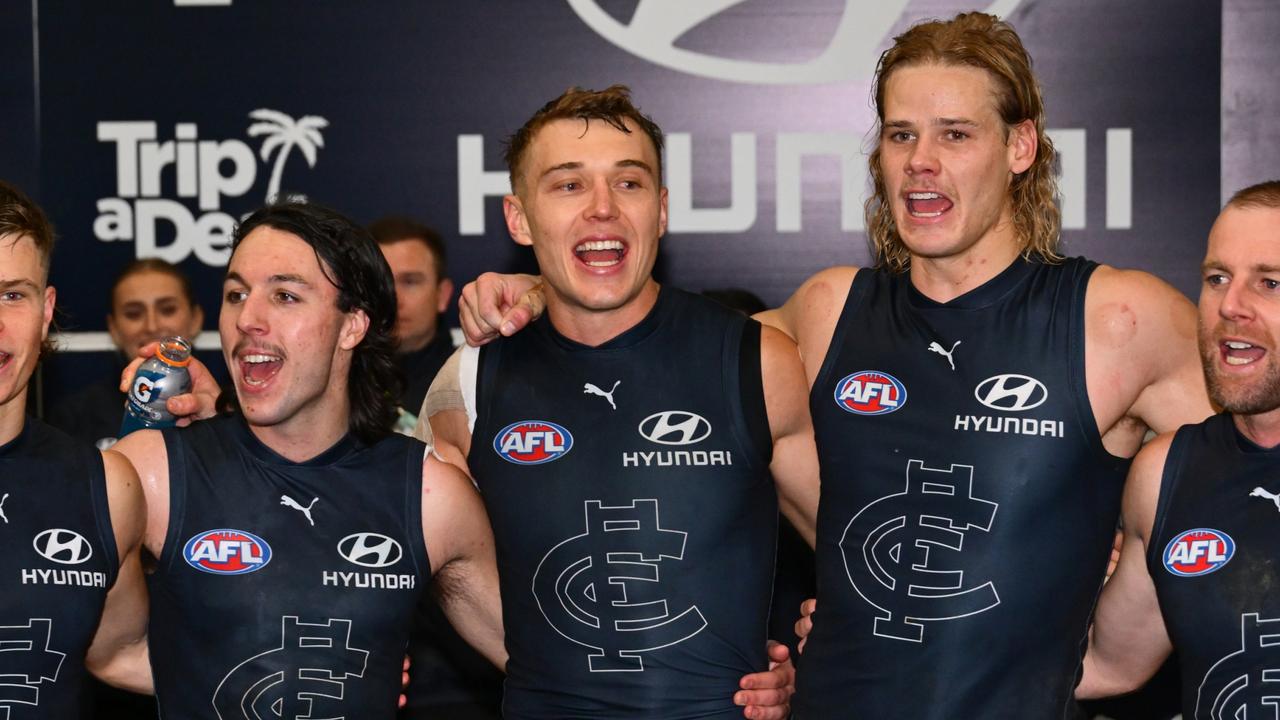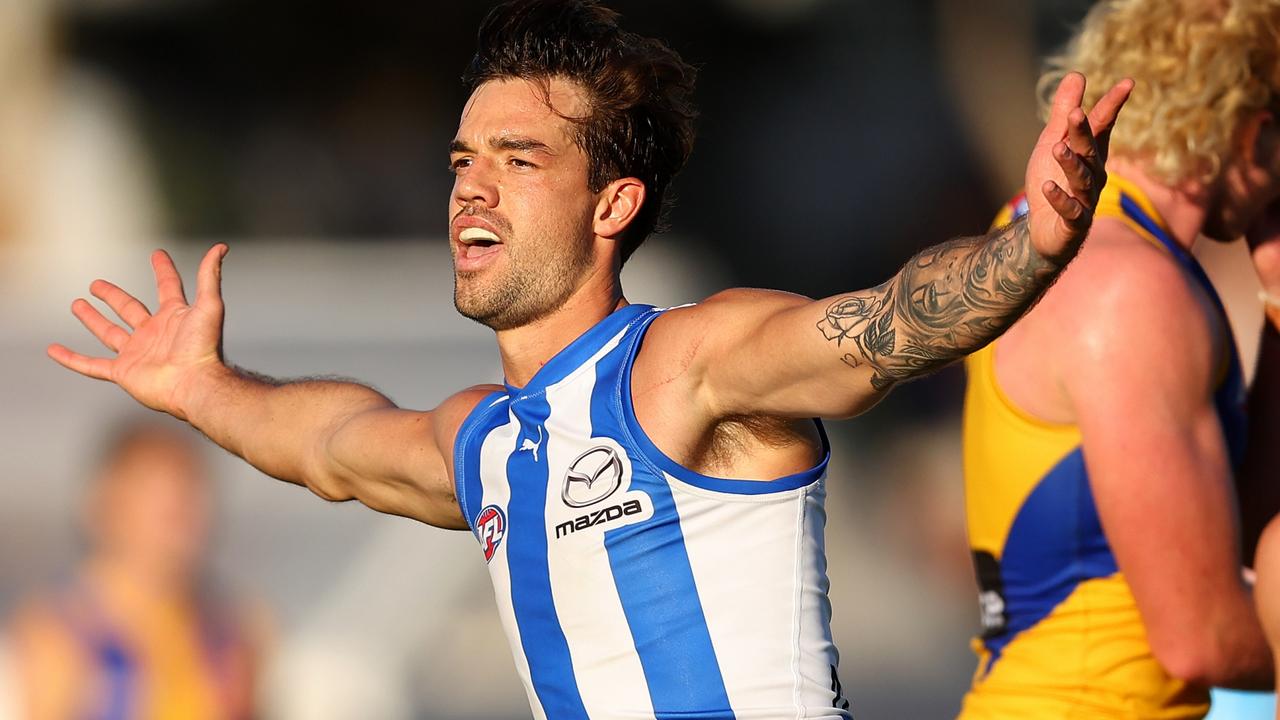Damian Monkhorst opens up on his heart attack, the road back and getting a second chance
Damian Monkhorst predicted his own heart attack almost three months before it took place. Then, if it wasn’t for a phone call, he might have gone to work while it was happening. Hear his story.
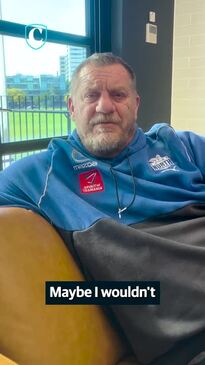
AFL
Don't miss out on the headlines from AFL. Followed categories will be added to My News.
Damian Monkhorst predicted his own heart attack to Trudi, his partner of almost 40 years, almost three months before it happened.
But Collingwood’s 1990 premiership ruckman and North Melbourne’s part-time ruck coach didn’t heed the warning signs.
It was early January and the 55-year-old was preparing to go back to work at his large-scale plumbing business, feeling anxious about the challenging economic times confronting the building industry.
The telltale signs that something wasn’t right had been there for the previous six months.

Normally a laid-back character who never took his work home with him, Monkhorst began waking up at two or three o’clock in the morning, stressing about deadlines and contracts.
Regular headaches, a sore neck and shoulder pain, in hindsight, were like a ticking time bomb sitting inside his chest.
He was feeling exhausted and as a result of his anxiety, he was snacking more and exercising less, using only Voltaren to combat the headaches.
“I predicted this to my missus (Trudi), I said ‘this stuff is going to give me a heart attack’,” Monkhorst told the Sunday Herald Sun this week.
“I had a sore shoulder and neck, which I initially put down to riding my motorbike. I had been getting random headaches for six to 12 months.
“I was looking at the other reasons why I was getting these headaches without looking at the real reasons, which was a build up of blood pressure and my head was pumping.”
He feared there might be a tipping point.
But like he did as a man-mountain Magpie, who pushed through pain without complaint in 205 games from 1988-99, and 10 with St Kilda in 2000, as well as a playing coach for his hometown Woori Yallock until he was 42, Monkhorst carried on … until he couldn’t!
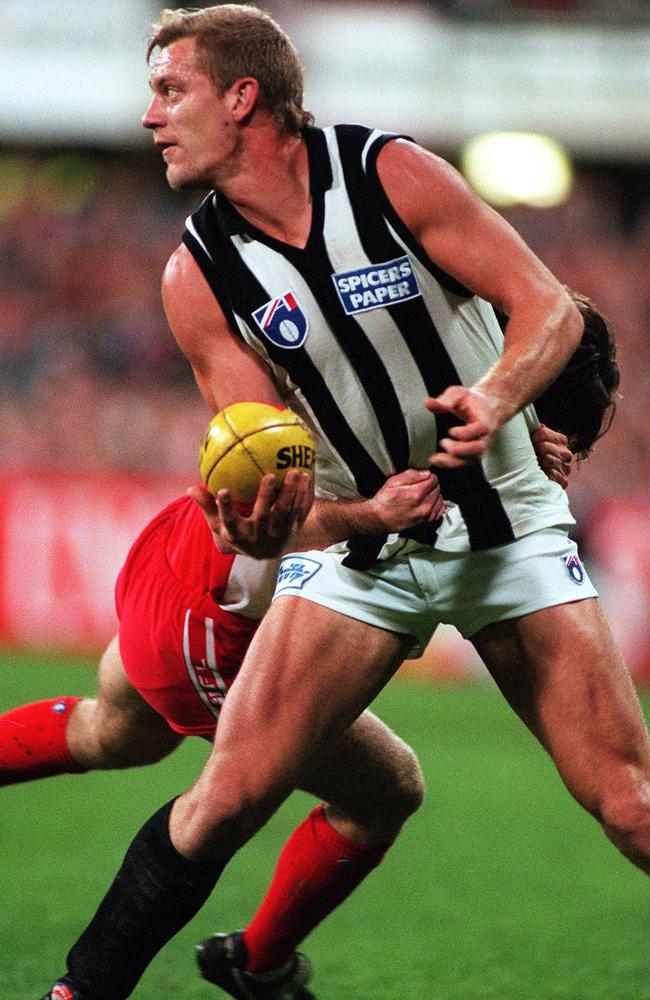
‘I THINK I’M HAVING A HEART ATTACK’
Monkhorst has an “in-built alarm clock”, the product of combining football with plumbing.
But he almost had a chuckle to himself when he woke up on the Monday morning after daylight savings ended in early April.
He had forgotten to turn the clock back. It was actually 4am, not 5am, when he got up for his early morning coffee.
Then everything changed … quite literally in a heartbeat.
“I started to feel like I couldn’t catch my breath,” he recalled. “I started sweating, I had a sore shoulder and I felt really uncomfortable in my chest.”
“The pain got so bad that I was dry retching … I ended up on the veranda throwing up, I thought I must have had some sort of bug.
“Again, I was in denial. I finished my coffee, jumped in my LandCruiser and took off for work.”
Monkhorst had stopped for diesel in Emerald when chest pain returned.
Then it got much worse.
“I was driving down Wellington Road when it really kicked in,” he said. “It was so bad that I rang Trudi and said: ‘Listen love, I was really crook this morning. I think I’m having a heart attack, should I go to the doctors?’.”
Trudi, who had started dating Monkhorst when he was a tall, lean Collingwood under 19s player in 1986, had never heard him complain before.
She knew something was wrong and urged him to go to Angliss Hospital in Ferntree Gully.
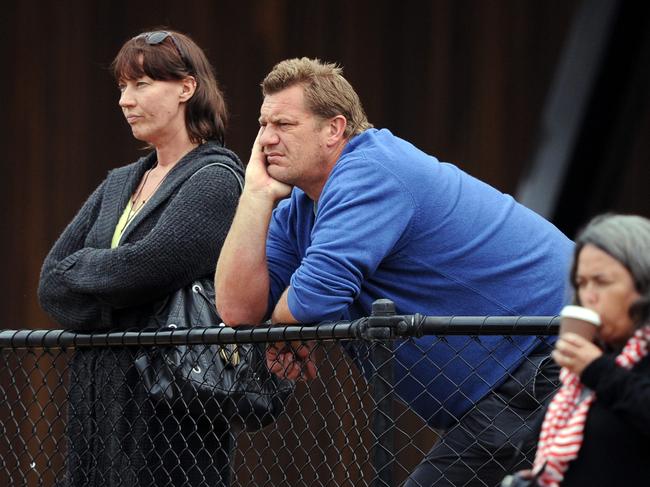
THE DECISION THAT MAY HAVE SAVED HIS LIFE
If Monkhorst had been in denial for months about his issues, it was his decision to follow his partner’s advice that ended up being one of the best he has ever made.
If he hadn’t, he might not be here now.
“I parked my truck out the front (of the hospital),” he said. “There was a hilly walk up to the hospital and I was on my hands and knees almost crawling up the hill.
“I was in real trouble. I saw the guy on the front desk and said: ‘I think I’m having a heart attack’. They settled me down a bit, chucked me in an ambulance and took me to Box Hill Cardio.”
So what would have happened if he hadn’t gone to hospital?
“From what I hear, it wouldn’t have been good,” Monkhorst said. “The doctor said how lucky I was. Stupid me, if I hadn’t made that call (to Trudi), I was highly likely to go into work and ignore what was going on, or if I still wasn’t feeling good, I was just going to drive home.”
That decision possibly saved his life.
Monkhorst spent three hours on the operating table as an interventional cardiologist put in two stents to repair blockages in his heart.
Incredibly, he watched it all unfold: “My veins were good, so they go in through your wrist. They go through the main vein all the way up. I was laying on the operating table and they had a TV there and I was watching my heart pumping.
“He (the cardiologist) squirts in a dye and you actually see the dye going in where the vessel has blown apart. He said ‘That’s a massive heart … he had to do the two biggest stents.”
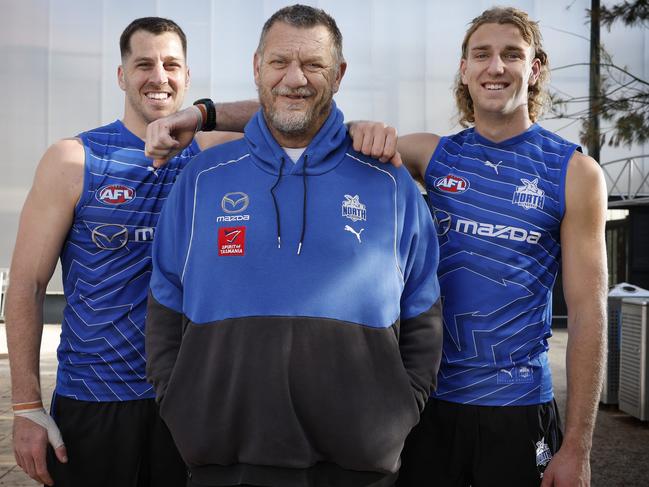
THE ROAD BACK
Monkhorst was told afterwards that his blood pressure was in the 200’s at one stage, and although he had no cholesterol issues, stress most likely caused the vessels to burst.
He hadn’t checked his blood pressure, though he had the monitoring equipment at home.
“The stupid thing is my son (Brent) had a heart transplant (in 2008), he had cardiomyopathy, which is a whole different thing,” he said.
“So we still had the blood pressure things there to check at home, but it just didn’t register.”
Monkhorst vowed to follow his doctor’s advice to make significant changes to his lifestyle.
He’s on blood pressure tablets now and is doing cardiac rehabilitation.
He is also in the process of shedding extra kilos after ditching the snacks, getting more exercise in his part-time role as Kangaroos ruck coach – on the treadmill or the weights room before training – and doing countless kilometres on his much loved BMW motorbike.
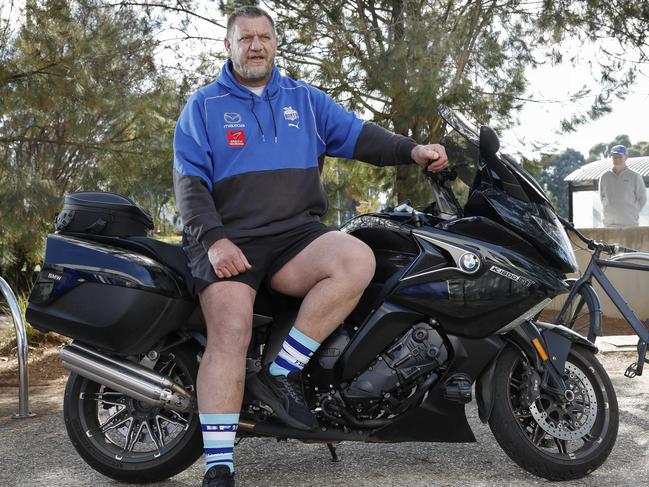
He’s also resolved to never let work stress cause the same anxiety.
“I nearly fell over when I jumped on the scales in there (the hospital),” he said of his weight.
“I usually stay at a certain weight, which is just under 150kgs, but in recent times, with the stress and everything else, it was a bit over.
“I’m back under that now, and I have got a long way further to go. I’m not starving myself, it is all about eating well and stopping the snacks.”
THE ROAD AHEAD
Monkhorst wants to raise awareness for others who might be feeling the same stresses or similar health challenges, insisting if your body is telling you something is wrong, you must immediately see a doctor – and make changes.
“I really do feel like I’ve got a second chance,” he said.
Monkhorst and Trudi became grandparents for the first time just a few weeks after his heart attack.
“Our second eldest son Ben and his partner Tracy had a little girl, Skylar,” he said. “My lad said: ‘You nearly didn’t make it’.
“I would have missed out on holding and cuddling my first granddaughter (Skylar) by a couple of weeks.”
His passion for motorbikes and his ruck coaching role at North Melbourne are both aiding his recovery.
“You don’t see many motorbikes parked out the front of psychologists,” he said with a smile.
“Guys who ride bikes will understand it, you get out and go for a cruise in the country and through the mountains with a group of mates. There is nothing like it.”
Eager to learn more about his high-performance BMW bike, he was in contact with experts in the United States.
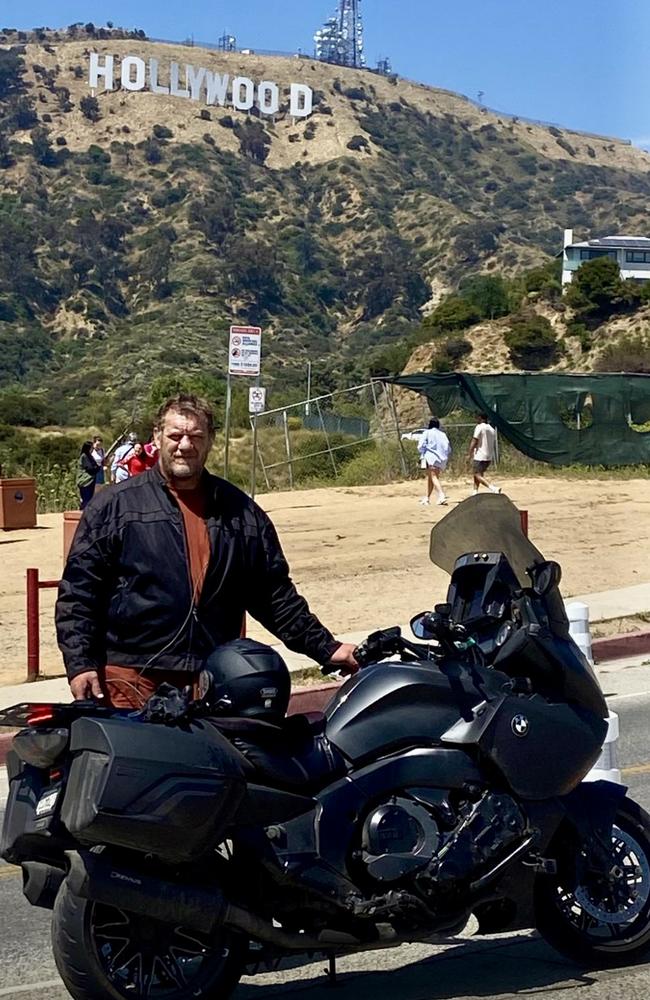
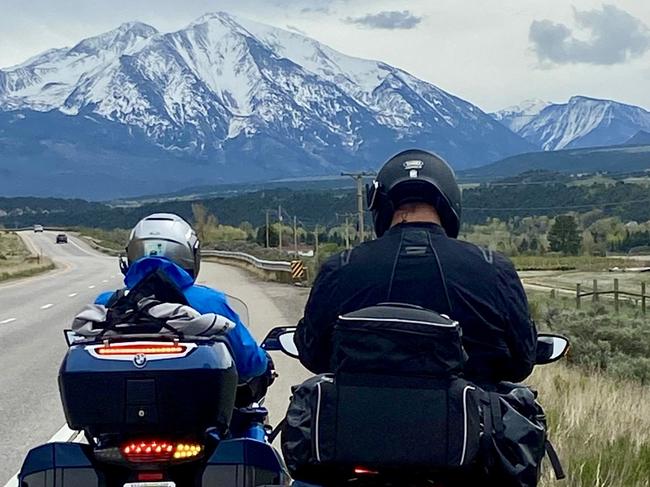
That connection saw them invite Monkhorst and his childhood mate Brendan Hay to the US last year to traverse some of the world’s most picturesque highways.
“We bought some bikes in Virginia … we rode the (Great) Smoky Mountains, through the Appalachian Mountains and the Blue Ridge Mountains … There is this famous road over there called the Tail of the Dragon, which has about 320 corners in about 15 kilometres.
“We went to the Ozark Mountains, to the Grand Canyon, Kansas City, Denver and through the Rockies. We rode through Death Valley, the Sierras, and then my mate and I did about 10 days of riding through California, down the Pacific Highway 101.”
Monkhorst met a Police Senior Inspector in Death Valley, who promised to organise a police escort to the famous Route 66 sign on Santa Monica Pier.
He was true to his word. The Santa Monica Police even took Monkhorst out for lunch.
Monkhorst and his mate are heading back to the US next month for a three-week riding tour, starting at Thousand Oaks in California.
“We are going to ride up to Oregon, cut across to Wyoming, do Yellowstone then head north into Canada. We’ll ride to Banff, through the glaciers, we’ll come back down through Montana, Mount Rushmore and then back down to Kansas City.”
He will take three weeks off his role as part-time ruck coach of the Kangaroos, a position he absolutely loves.
He worked with Alastair Clarkson for years at Hawthorn, including a three-peat of flags in 2013-15.
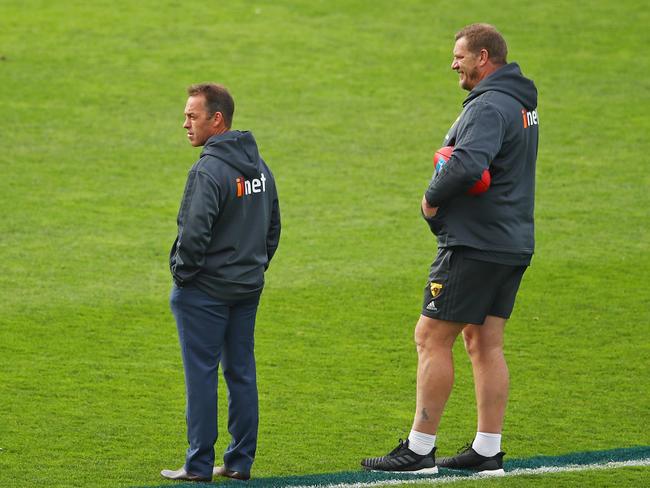
“After the Hawks gig, I retired. But Clarko came to me and said: ‘Come here part-time, and if you want to go off motorbike riding at times, that works’.
“I absolutely love building those relationships with the young guys (at North Melbourne),” he said. “I hate to think I’m a coach who judges them. I’d rather them feel like I’m in the trenches with them.
“Tristan (Xerri) has been great. You can see Taylor Goad and Will Dawson maturing and I think they will be very good senior players. Brynn Teakle, ‘CJ’ (Callum Coleman-Jones) and young Finnbar (Maley) are all improving and playing their roles to push for senior selection.”
Such was his passion for the group that he only missed one game of the Kangaroos when he was recovering from his heart attack – the Gather Round clash with Gold Coast.
He flew to Western Australia on Saturday morning to prepare the rucks for their clash with West Coast in Bunbury on Sunday.
Monkhorst maintains the Kangaroos are on the right pathway under Clarkson, given the hard work they are willing to put in.
Just as he knows, the work he is putting into his own recovery will similarly be rewarded.
Originally published as Damian Monkhorst opens up on his heart attack, the road back and getting a second chance


